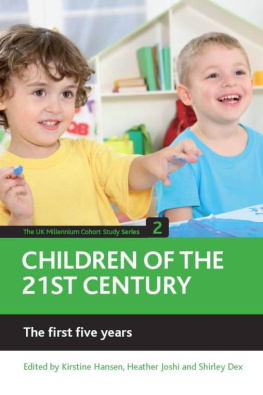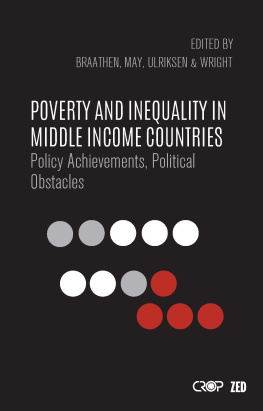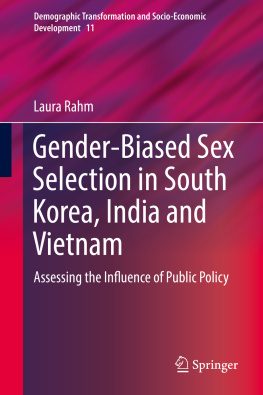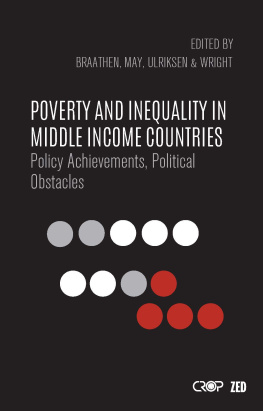TRACING THE CONSEQUENCES OF CHILD POVERTY
Evidence from the Young Lives study in Ethiopia, India, Peru and Vietnam
Jo Boyden, Andrew Dawes, Paul Dornan
and Colin Tredoux
First published in Great Britain in 2019 by
Policy Press University of Bristol 1-9 Old Park Hill Bristol BS2 8BB UK Tel +44 (0)117 954 5940 e-mail
North American office: Policy Press c/o The University of Chicago Press 1427 East 60th Street Chicago, IL 60637, USA t: +1 773 702 7700 f: +1 773-702-9756
Policy Press 2019
The digital PDF version of this title is available Open Access and distributed under the terms of the Creative Commons Attribution-NonCommercial 4.0 license (http://creativecommons.org/licenses/cc-by-nc/4.0/) which permits adaptation, alteration, reproduction and distribution for non-commercial use, without further permission provided the original work is attributed. The derivative works do not need to be licensed on the same terms.
British Library Cataloguing in Publication Data
A catalogue record for this book is available from the British Library
Library of Congress Cataloging-in-Publication Data
A catalog record for this book has been requested
978-1-4473-4831-3 paperback
978-1-4473-4836-8 ePdf
978-1-4473-4837-5 ePub
978-1-4473-4838-2 Mobi
The rights of Jo Boyden, Andrew Dawes, Paul Dornan and Colin Tredoux to be identified as authors of this work has been asserted by them in accordance with the Copyright, Designs and Patents Act 1988.
All rights reserved: no part of this publication may be reproduced, stored in a retrieval system, or transmitted in any form or by any means, electronic, mechanical, photocopying, recording, or otherwise without the prior permission of Policy Press.
The statements and opinions contained within this publication are solely those of the authors and not of the University of Bristol or Policy Press. The University of Bristol and Policy Press disclaim responsibility for any injury to persons or property resulting from any material published in this publication.
Policy Press works to counter discrimination on grounds of gender, race, disability, age and sexuality.
Cover design by Hayes Design
Photo credits: The images throughout our publications are of children living in circumstances and communities similar to the children within our study sample. Young Lives/Nguyen Quang Thai; Trinh Van Dang.
Readers Guide
This book has been optimised for PDA.
Tables may have been presented to accommodate this devices limitations.
Image presentation is limited by this devices limitations.
Contents
List of figures and tables
Figures
Tables
Notes on authors
Jo Boyden is Professor of International Development/Director of Young Lives, Oxford Department of International Development. She is an authority on child development and childrens rights and has worked on research and policy with children, particularly child labour, education, children in conflict, as well as publishing on childhood resilience in the context of adversity, poverty, and socio-cultural development.
Andrew Dawes is Associate Professor Emeritus in Psychology at the University of Cape Town and a Research Associate with Young Lives. His expertise includes the development indicators for measuring childrens rights and wellbeing, prevention of child maltreatment and violence to young children, and evaluations of early childhood development programmes in African settings. He has extensive experience in translating research to policy.
Dr Paul Dornan was Senior Policy Officer at Young Lives in the Oxford Department of International Development. He is a social policy analyst with expertise in social policy and child poverty and was responsible for leading policy activity within Young Lives.
Colin Tredoux is Professor of Psychology, University of Cape Town, South Africa, and Chaire dAttractivit, CLLE, Universit de Toulouse, CNRS, UT2J, France. His interests in Social Psychology include contact theory, and the micro-ecology of contact and segregation. He has published widely in a range of journals, including American Psychologist, South African Journal of Psychology and Psychological Science.
Acknowledgements
Young Lives has been a collaborative partnership between 12,000 study children, their families and their classmates, research institutes, universities and non-governmental organisations (NGOs) in four study countries, and a team based at the University of Oxford, together with researchers at University College London and other universities in the UK and USA. We are hugely grateful to the children and families who have participated in the study. Without their generosity, patience and willingness to talk to field workers regularly over a period of 15 years, often about sensitive subjects, the Young Lives study and its rich dataset would not exist. Special thanks are also owed to our collaborators, and to our research, communications and policy teams, data managers, field supervisors, and all other Young Lives staff for their contributions to so many aspects of the study, from the rigorous research design, high-quality data and publications, to the vital administrative support and robust engagement with policy and practice. Sharon Huttly merits special mention for her conscientious and steadfast stewardship of Young Lives during an earlier phase of the study, which created an essential foundation for the later research.
This book has benefited from the contributions of many people although any errors are of our own making. In particular, we wish to thank Deborah Walnicki, who played an invaluable research assistance role by analysing qualitative data and sifting through interview transcripts for appropriate quotes, drafting selected texts, undertaking literature searches and compiling and checking references. Deborah displayed considerable flexibility, patience and good humour, despite the multiple demands placed on her. The book synthesises analyses produced by numerous study colleagues and reflects their careful and important work. It also draws on new work by Kristine Briones, Gina Crivello, Joaquin Fuenzalida Concha and Ginny Morrow. Marta Favara and Patricia Espinoza-Revollo have generously given time throughout to respond to data questions.
Additionally, we are grateful for the insight, guidance and support of a distinguished advisory group, Frances Stewart, Richard Morgan, Martin Evans, Dominic Richardson and Catherine Porter. We are indebted to Santiago Cueto, Angela Little, Richard Morgan, Alula Pankhurst, Anne Peterson, Martin Woodhead and members of the Young Lives International Advisory Board, for reviewing various elements of the work and providing meticulous and constructive feedback. We have benefited from opportunities to present earlier drafts of this work to the Department for International Development (DFID), the Global Coalition to End Child Poverty and Save the Children and appreciated thoughts and comments.
Young Lives was initiated and core funded from 2001 to 2018 by UK aid from DFID. The vision, resources, advice and direction provided by many DFID staff over the years have been fundamental to the studys longevity and success. Further research and policy engagement has also been funded by the Bernard van Leer Foundation, the Bill & Melinda Gates Foundation, the Childrens Investment Fund Foundation, the Dr Mortimer and Theresa Sackler Foundation, Echidna Giving, the Economic and Social Research Council (ESRC), Grand Challenges Canada, the Inter-American Development Bank, the International Development Research Centre, Irish Aid, the Medical Research Council, the National Institutes of Health, Netherlands Ministry of Foreign Affairs, the Norwegian Embassy in Vietnam, the Oak Foundation, the Old Dart Foundation, Open Society Foundations, Oxfam GB, the Oxford Martin School, Plan International, Save the Children UK, UNESCO, UNICEF, the William and Flora Hewlett Foundation and The World Bank. We are extremely grateful for the support given by these organisations, their financial contribution building on the core DFID-funded research to enable deeper analysis of specific topics and broadening Young Lives sphere of influence.







